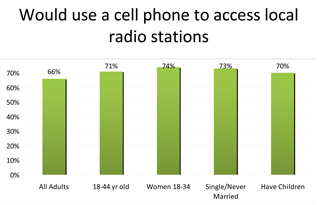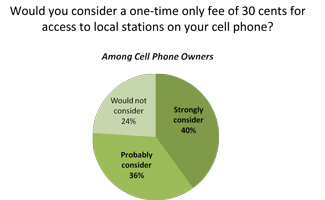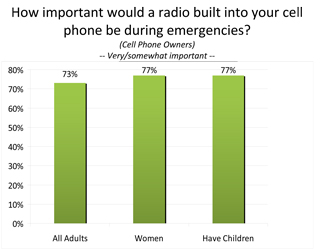


WASHINGTON -- The National Association of Broadcasters today issued a statement applauding the results of a new nationwide poll conducted by Harris Interactive, which show that a sizeable majority of American cell phone users would like the ability to listen to their favorite local radio stations through a built-in radio receiver on their mobile phone. The survey, conducted as part of an online nationwide omnibus survey of 2,587 adults representing the U.S. general adult population, was conducted by Harris Interactive and commissioned by NAB.
"Today's survey results demonstrate convincingly that there is significant demand for radio-capable cell phones in the United States," said NAB Executive Vice President of Communications Dennis Wharton. "Unfortunately, most U.S. mobile phone users have been denied over-the-air access to their favorite free and local stations. With much of the U.S. cell phone market built upon exclusive contracts between carriers and manufacturers, most consumers are left paying for fee-based data-intensive streaming apps with no free, broadcast alternative."
Today's poll findings showed:
Today's poll results, as released by Harris Interactive, are available online, and follow other recent studies evaluating the global demand for radio-enabled cell phones. A 2008 study from global market research firm TNS found that 45 percent of mobile users in Latin America and Asia cite AM/FM radio as one of their top three reasons for purchasing a mobile phone -- making the feature more popular than Internet access, texting and a camera function. Another 2008 study, commissioned by NAB's technology advocacy program, NAB FASTROAD, concluded that the growth of FM-capable mobile handsets is "very robust" from a global perspective, and expected to reach 45 percent, or 700 million handsets, by 2011.
Opining in a recent blog, NAB's Wharton suggested what might be motivating U.S. wireless carriers and device manufacturers to prevent consumer access to FM-enabled cell phones: "It could be a simple case of anti-competitive behavior," he wrote. "Every minute a cell phone user listens to free, local radio is one less minute spent using the wireless industry�s fee-based applications. Moreover, since listening to local radio would require no network bandwidth, cell phone subscribers wouldn�t be forced to pay the escalating rates associated with streaming data-rich, fee-based applications."
About NAB
The National Association of Broadcasters is the premier advocacy association for America's broadcasters. NAB advances radio and television interests in legislative, regulatory and public affairs. Through advocacy, education and innovation, NAB enables broadcasters to best serve their communities, strengthen their businesses and seize new opportunities in the digital age. Learn more at www.nab.org.
###